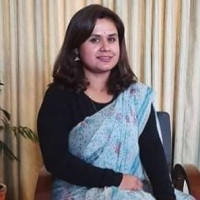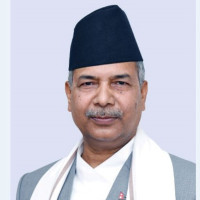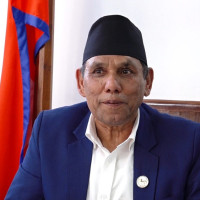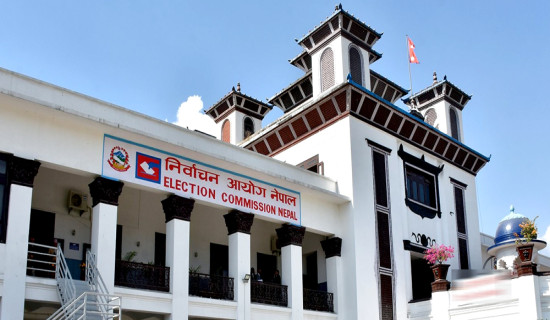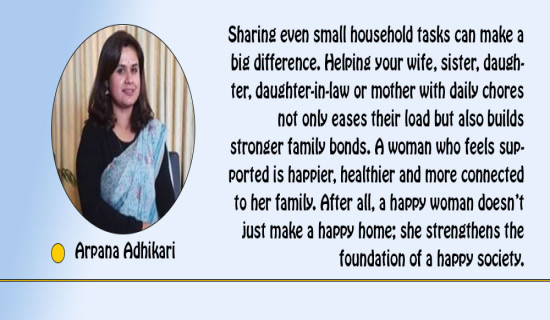- Thursday, 15 January 2026
Many men opt to fast on Teej, making their spouse feel valued
Kathmandu, Sept,1: Teej ko lahara aayo bari lai! Haritalika Teej, one of the merriest festivals for Hindu women in Nepal, is less than a week away, with this year’s celebration slated for coming Friday.
Teej is traditionally observed by wives by keeping a fast for their husband’s long and healthy life. Thus, this festival conjures images of married women dressed in bright red, bangled wrists, vermillion on hair and beaded necklaces (potey) observing a strict waterless fast.
Some unmarried women and girls fast too, praying for an ideal partner.
However, recently the festival has experienced a conspicuous shift in its observance. Breaking the traditional norms of Teej, which primarily revolves around women, some men are setting new trends.
They are the ones who quietly participate in the festival but are never seen indulged in the feasts or openly acknowledge their participation.
Today, many men believe in bending the rules by giving company to their wives and women of their family in Teej celebration, something that was not considered earlier. Kiran KC, veteran comedian popularly known as ‘Rata Makai’, is among the few men who observe fast during Teej.
Speaking to The Rising Nepal, KC shared that he has been fasting for over 25 years.
“My wife used to fast on Teej without even drinking water. One day, I realised how this woman, who was once a stranger to me, has been observing such a strict fast for my health and longevity.”
“She left her family to be with me, showered me with love, and took care of my belongings, my family, and my relatives, all for my well-being,” he said.
“That’s when it hit me—I should be fasting for her long life instead. Without her, my life wouldn’t be as wonderful. So, I started fasting for her. Since then, we fast together,” KC added.
KC recalled being called a ‘Joitingrey’ (henpecked) by people for fasting on Teej. About 25 years ago, after worshipping Lord Shiva at Pashupatinath on Teej, a TV reporter asked if he was fasting too.
When he said yes, someone in the crowd called him ‘Henpecked’.
He added, “And I responded, so a husband who fasts for his wife is called ‘Joitingrey,’ but a husband who drinks alcohol while his wife is fasting is considered ideal? The woman was left speechless.”
Pramod Kharel, a renowned singer, shared that he is also willing to fast on Teej.
In 2022, when his wife was ill and unable to observe the fast, he observed the fast on her behalf.
He wanted to continue this tradition, but for the past two years, Kharel has not observed Teej.
Similarly, Murari Upadhyay, a 40-year-old man from Dhumbarahi, is often called ‘henpecked’ by his relatives and neighbours for fasting during Teej and helping his spouse with household chores.
Upadhyay, who has observed Teej fasting for the past 14 years, shared that his journey began when his wife was pregnant.
He said, “She wanted to continue fasting even while pregnant, but I didn’t permit it. Seeing her unhappy, I decided to fast on her behalf, promising to do it for both her and our baby.”
Since then, Upadhyay and his wife have been celebrating Teej together. He also accompanies his wife to the temple.
Pradeep Lamsal, a 45-year-old yoga instructor from Budhanilkantha, is another man who has stepped away from traditional customs by observing Teej fasting for the past eight years.
He started fasting on Teej in 2016 when his wife, Kalpana, was suffering from ulcers. “That year, she was very ill and undergoing treatment. It was the first time she couldn’t fast, and she was heartbroken,” he recalled.
Seeing her in distress, Lamsal decided to take on the fast for her health and long life. Since then, he has continued to fast on her behalf. Kalpana’s gastric issues still prevent her from fasting.
Lamsal believes that men can also be a part of this tradition. “If my wife can fast for my health and long life, why can’t I do the same for her?” he said.
Not only married men but also some unmarried men observe the Teej fast for the well-being of their families.
Aadesh Mishra, 28, from Patan, has been observing the Teej fast since 2009 when he was in grade nine. He began fasting because his mother always observed the Teej fast without drinking water all day, which made her ill.
Mishra recounted that he used to urge her to drink water or take medicine, but she refused.
“One year, I decided to fast myself to show her how unreasonable it was. Surprisingly, my mother didn’t stop fasting; instead, I continued,” he laughed.
Mishra now fasts for his family and mother. When asked if he plans to continue this practice after his marriage, he said, “A wife’s longevity should be as important to a husband as a husband’s is to a wife. If Teej is meant to ensure that, then I am committed to fasting to ensure my wife’s long and healthy life.”
What Hindu scriptures say about men observing Teej Fast
Acharya Yadhu Nandan Bhardhwaj, a Sanskrit scholar, stated that while the Teej fast is primarily for women, it is considered equally beneficial for both men and women.
Hindu scriptures do not restrict men from participating in the fast, he said, adding, “Teej fast is not just for married women. If it were, then the festival, which began with Goddess Parbati’s fasting, would only be observed by unmarried women and girls. She was unmarried when she undertook the fast and austerity with a wish to have Lord Shiva as her husband.”
According to Acharya Bhardhwaj, the merits of the Teej fast do not automatically transfer to the husband when wife observes the fast.
“The scriptures state that the person who fasts is the primary recipient of its benefit. However, if someone wishes to share the merits of their fast, the person with whom they wish to share may receive some of those merits, such as women or men fasting to seek the longevity and good health of their partners,” he added.
“Therefore, anyone can observe the fast, and whoever does, whether male or female, will be the primary recipient of its benefits,” said Bhardhwaj.
Culture expert’s take on the issue
Prof. Dr. Beena Poudyal, retired head of Tribhuvan University’s Central Department of Nepalese History, Culture, and Archaeology, said beyond the traditional fasting by wives, many men are now participating in the Teej fast.
Some men were observing the fast in place of their ailing wives, while others joined their partners in the ritual, offering support and companionship, she added. According to her, it is more beneficial for both husband and wife to fast and perform worship together than either of them doing it alone.
“The religious scriptures, such as the Shiva Puran, Skanda Puran, and Bishnu Puran, mention that devotees who fast and worship can gain greater merits when these rituals are performed together with their spouse,” said Dr. Poudyal.
Furthermore, majority of Lord Shiva’s devotees, including Nandi, Bhringi, and other members of Shiva’s entourage, are men.
“His devotees are encouraged to offer worship throughout the year, so there is no reason men cannot participate in the Teej fast,” she added.
Women’s perspectives: A supportive role
Meena Parajuli, wife of Murari Upadhyay, shared how fortunate she feels when her husband fasts for her and their daughters’ well-being.
“This is what I call shared commitment and mutual respect in a relationship,” she added.
Kalpana Lamsal, wife of Pradeep Lamsal, shared her thoughts on her husband’s participation in the Teej fasting, saying, “I feel very special when my husband keeps fast for my well-being and also adds respect I have for my husband.”
Laxmi Khanal, advocate and writer, said that men could also fast for their wives. If a woman can fast for the wellbeing of her husband, then why can’t men do the same for their wife?
This would make their wives feel special and deepen their relation, she said, adding, “Men can prove the importance of each other’s role as two wheels of the same chariot by making this festival more special for them.”
Even if they can’t fast, they can organise a Darr party, help around the house and give them space for celebrations to make the occasion special, she added. As the festival evolves, it demonstrates a more inclusive celebration that recognises the diverse ways individuals can honour the spirit of the occasion.


